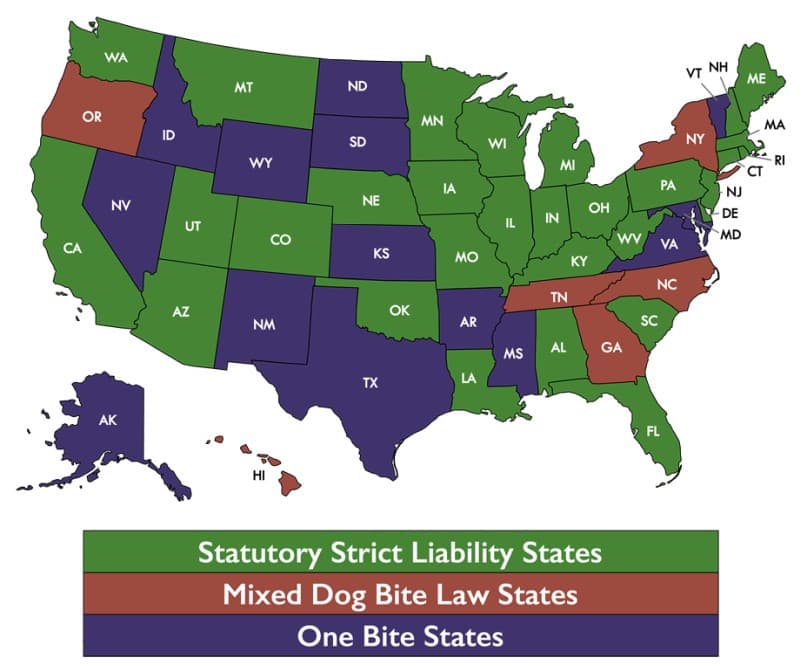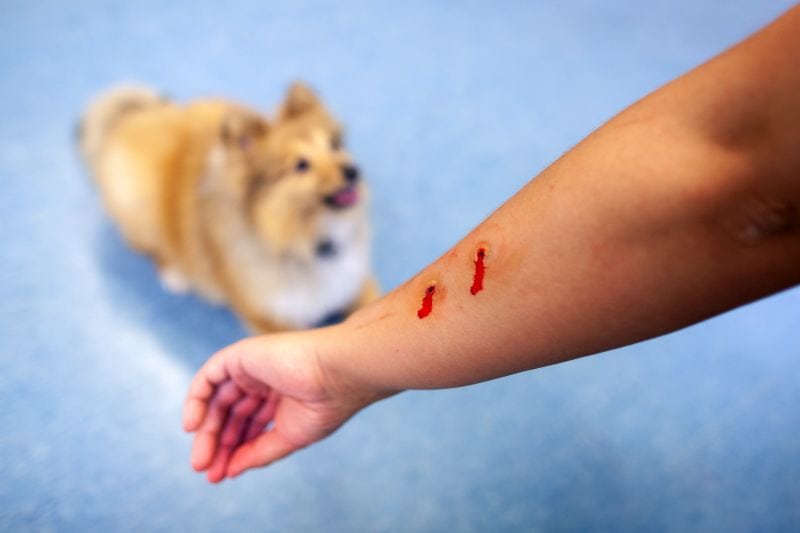What Is the “One Bite” Rule for Dogs?
Sometimes referred to as the “One Free Bite Rule,” this principle means that owners may not be liable for damages caused by a dog’s first bite.
The thought behind the legislation is that dogs are animals, and animals are unpredictable. Under this principle, a dog must have an established history of bites (meaning more than one instance) to put its owner at risk of criminal or financial penalties.
But in the event of a subsequent bite, you can be held responsible since you knew what your dog was a potential bite risk.
But this is not a universal legal principle in the United States — some states embrace such laws, while others do not. States without “one bite” laws are known as strict liability jurisdictions, meaning that you may suffer legal ramifications following any bite — whether it’s your dog’s first or not.

One bite laws do still exist in several states, including Texas, New York, and Virginia, but the legal particulars involved may vary.
For instance, in New York, the rule applies to criminal charges, but you can still be on the hook for lawsuits following your dog’s first bite. And one-bite rules aren’t always “air-tight defenses” either, as you may still be held liable if it can be proven that you knew your dog was aggressive.
Most states have adopted strict liability laws, deeming owners responsible for all bites, including the first. These strict liability laws may sound harsh, but they are designed to make it possible for bite victims to receive compensation for medical or veterinary bills if they or their pets are attacked by a dog.
What Happens When Your Dog Bites Someone?
Laws and procedures vary by location, but for the most part, dog bites are handled similarly around the US.
Most commonly, the sequence of events following a bite will follow this basic pattern:
Civil action may occur after this point, essentially meaning that the victim may take you to court seeking damages.
In most cases, dog bite incidents rarely go beyond the first two steps, but it’s always a good idea to consult a lawyer to navigate the legal environment. It’s also a good idea to document the incident details and gather witnesses, if applicable.
Will a Dog Be Euthanized for Biting Someone?

Determining whether or not your dog will be euthanized after biting someone is a complicated matter, and there is no one-size-fits-all answer to the question.
Laws vary by state, county, and sometimes even by city. Outcomes differ from case to case, as well.
But while it’s possible that your dog could be euthanized for biting someone, it just isn’t very common.
Several factors will play a part in determining the ultimate outcome for your dog:
Just understand that euthanasia isn’t automatic for dogs who fit one of these parameters — it’s often a “big picture” thing. Suffice to say, euthanasia is far more likely for a German shepherd who’s inflicted several severe bites than it is for a Labrador who delivers a minor nip for the first time.
Do note that in the extremely rare event of a rabies infection, euthanasia is the only option, as rabies is incurable once symptoms have appeared.
Dog bites — even relatively minor ones — may lead to serious legal and financial repercussions for you and your pet. And, as we’re discussing here, your pet’s very life may even hang in the balance.
Accordingly, you’ll want to reach out to an attorney immediately following any dog bite and heed the advice provided. It’s the best way to achieve the best possible outcome from this point forward.